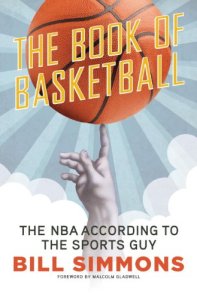You’ve got to hand it to Bill Simmons, aka The Sports Guy.
Even if you’re not a Celtics fan, even if you find him incredibly self-promoting, even if you disagree with every single one of his opinions and even if you tire of his endless references to the Rocky series, you have to admit one basic fact.
The man has made a career of being a sports fan.
A passionate, informed and prolifically writing sports fan, to be sure, and, let’s face it, the man is paid to watch, talk and write about sports.
Plenty of sportswriters do this, too, but Simmons is different to the extent that he is a fan first and foremost.
I’ve got some grounds to make this statement because I spent a lot of time with Simmons this past weekend, thanks to my brother Mike, who gave me The Sports Guy’s newly released tome, The Book of Basketball.
I thoroughly enjoyed it.
While I cannot make it to his appearance today here in Chicago, I recommend that others consult his book tour schedule and go in other cities.
In part, my pleasure in reading Simmons stems from the fact that I get to relive cherished parts of my childhood.
We spent large chunks of his youth in Brookline, came of age during the 70s Red Sox and 80s Celtics era, and loved deeply our hometown teams and the endless statistics that came with following sports.
Larry Bird has a permanent place in our Sports Pantheon.
When he writes in The Book of Basketball about a game where Bird waved his arms to a hostile Clippers crowd before shooting game-winning free throws, for example, I remember watching that with best friend Pete D’Angelo.
The intersecting nature of our childhoods aside, I liked The Book of Basketball because it shows Simmons in all his passionate, knowledgeable and at times excessive fullness.
To begin, the book is 700 pages long-a fact that he mentions both in the footnotes toward the end and in the acknowledgments, when he quotes his wife, The Sports Gal, saying, in essence, that she will leave him if he ever proposes to write another book of similar length.
Readers who follow Simmons’ columns will find a lot of recycled material in the book, and there is much that is new.
He has a five-tier Hall of Fame and identifies the 75 players who should occupy those levels. He takes the reader through the league’s history. He has lengthy discussions of the best teams of all time-a list that culminates, unsurprisingly, with the 1986 Boston Celtics.
Readers of Simmons’ previous work will find all the same ingredients: heavy doses of discussions with his father; plenty of self-referential interactions with everyone from Elgin Baylor to Tom Seaver to Bill Walton; lots of popular culture references; pinches of phrases like “Stick a fork in him”; and plenty of lists with criteria attached to them and the people or teams who fit them.
I skimmed certain parts of the history and will say that I read most, but not all, of the footnotes. And, to be sure, the book has its shortcomings.
His jokes and repeated digs at his “Grumpy Old Editor” aside, Simmons really could have written the same book at a little more than half the length. He asserts in several places that you know something is meaningful when you remember where you were when it happened-a proposition that need not be true, and, even if it is, probably does not bear repeating.
His criteria shift, but are argued with equal conviction.
He says that Bill Walton deserves to be on the list of Hall of Famers because of the brilliance he showed for a short time, but later gives Karl Malone the edge over Charles Barkley because Malone fulfilled his lesser potential while Barkley did not play at his highest level for long periods of time.
While Simmons does talk about the size of Dennis Johnson’s “equipment,” he neglected to include one of my favorite nuggets about DJ that Jim D’Angelo pointed out-that he picked his spots to the point where he did not score at all in the first half, but ended up with 17 points and a number of big steals in the 118-116 1988 Game 7 victory over the Atlanta Hawks that is most known for the Bird-Dominique duel.
But, in many ways, each of these criticisms both are what Simmons wants, an engaged readership, but, more than that, underscores the very point that he is able to write what he wants because it is HIS BOOK.
Near the end of the work, Simmons writes with just a slight tongue in cheek tone that The Book of Basketball is the second-best book about hoops ever. I don’t know about that, but I do know that I am very grateful to my brother for sending me this fantastic birthday present and I am grateful to Simmons for caring and writing about sports as much as he does.

